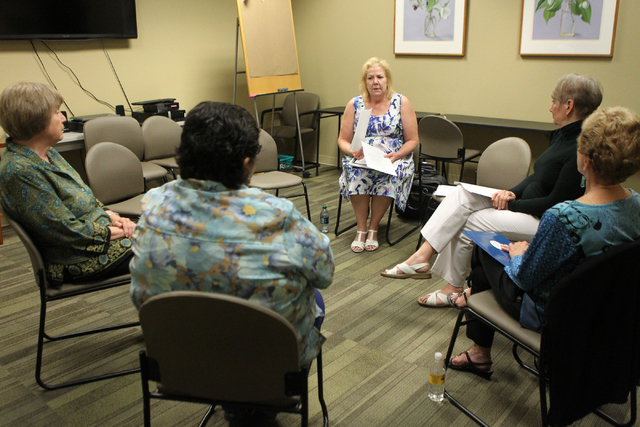Initiative aimed at helping Las Vegas-area moms with anxiety

Dignity Health’s WomensCare Centers has a new initiative: addressing anxiety in new mothers, an ailment not often recognized as an offshoot of postpartum depression. It’s being implemented at places such as the Barbara Greenspun WomensCare Center of Excellence, 98 E. Lake Mead Parkway, Suite 301.
Jacqueline Kennedy, who runs the Nevada Statewide Maternal Child Health Coalition, developed the training, which began in March. She and Kameron Klein, coordinator for the perinatal mood and anxiety disorders program, have been visiting with the Las Vegas Valley-wide Women, Infants, and Children (WIC) clinics. Each clinic sees roughly 100 families a month, Kennedy said.
“We see these moms come in for WIC care on a daily basis,” Klein said, “so, we see the gap. As a new mom myself, I have a 9-month-old; going through that transition in my own life, I’ve connected to the program. So, I know there’s a need. It’s a huge transition for moms.”
There is no way to predict who will face anxiety after giving birth, but one’s family history can be an indicator.
“Or, if they had it with their first child and are now having their second child, they’re most likely going to get it again,” Klein said, adding that the transitional nature of Las Vegas, where many people move with no support system, can be a factor in anxiety. “Being a single mom, maybe with no income, or with family, you see that a lot here in Nevada.”
The two women will soon address the topic with staffers at the two St. Rose Dominican hospitals in Henderson. With new mothers being discharged soon after giving birth, unless they’ve a C-section, there is not always time for hospital staffers to witness anxiety kicking in. For the 5,048 annual births at St. Rose de Lima’s San Martin and Siena campuses, for example, the mother’s average length of stay is 1.72 days.
“Most ladies want to get out of the hospital as soon as they can,” said Jennifer Cooper, spokeswoman for Dignity Health. “So that’s why you need people who are outside of a hospital setting — a lactation consultant, pediatrician or a WIC specialist — to interface with these people beyond the hospital setting.”
The Centers for Disease Control and Prevention reports that 11 percent to 20 percent of women who give birth each year suffer from postpartum depression. There are 4 million live births annually in the U.S. If 15 percent of those mothers have postpartum depression, that means roughly 600,000 American women are affected each year.
A 2013 study cited in the Journal of Reproductive Medicine states that 17 percent had anxiety and 6 percent showed depression symptoms in the first few weeks following birth. It also states that anxiety lasted longer, continuing even at six months following birth.
Symptoms of anxiety are varied. They can include not eating, not sleeping and worrying about the baby all the time, sometimes to the point where the mother won’t leave the house.
“They think they can take care of it by taking a walk or something,” Klein said. “But it doesn’t go away.”
Health care workers ask a set of questions to help assess whether the mother is having issues: Are you feeling sad? Is it difficult to enjoy yourself? Are you irritable or tense? Do you feel anxious or panicky? Are you having difficulty bonding with your baby? Family members may be asked similar questions about what they’ve noticed with the new mother.
Young fathers can experience depression around the same time. Kennedy said it likely results from the added pressure of being the man of the house, of trying to always be the strong one.
“So, it’s a new lifestyle; everything changes,” she said. “And if their wife is experiencing anxiety, (the dads) don’t know how to help or what to say. They’re not getting much sleep, either.”
“Mommy mixers” and talking to a therapist can be helpful for a woman experiencing anxiety.
“But we always ask them to contact their physician,” Kennedy said.
Contact Jan Hogan at jhogan@reviewjournal.com or 702-387-2949.
Anxiety symptoms
Nonstop worrying
A feeling that something bad will occur
An inability to stop racing thoughts
Sleep disturbances
Loss of appetite
The inability to sit quietly


















